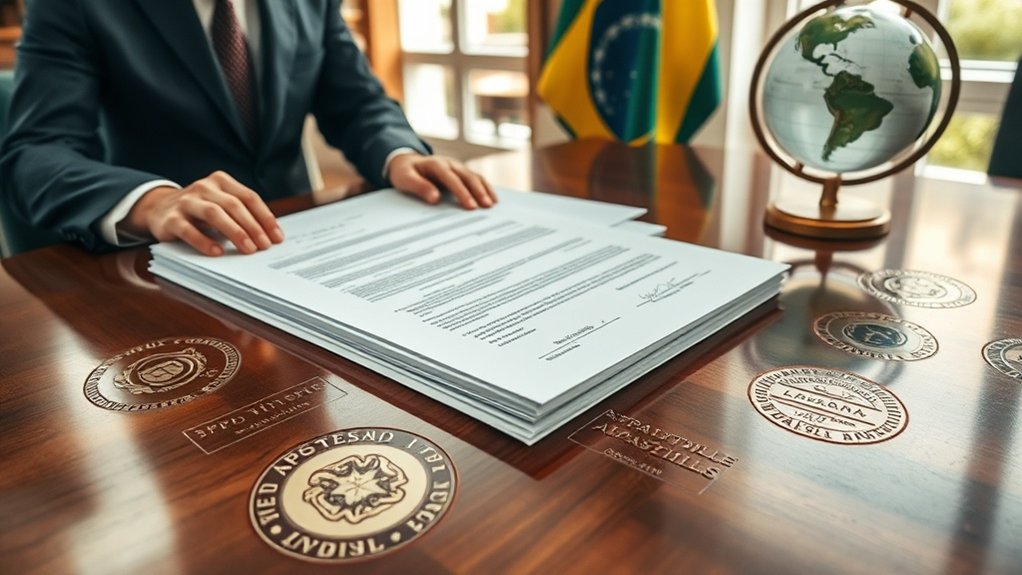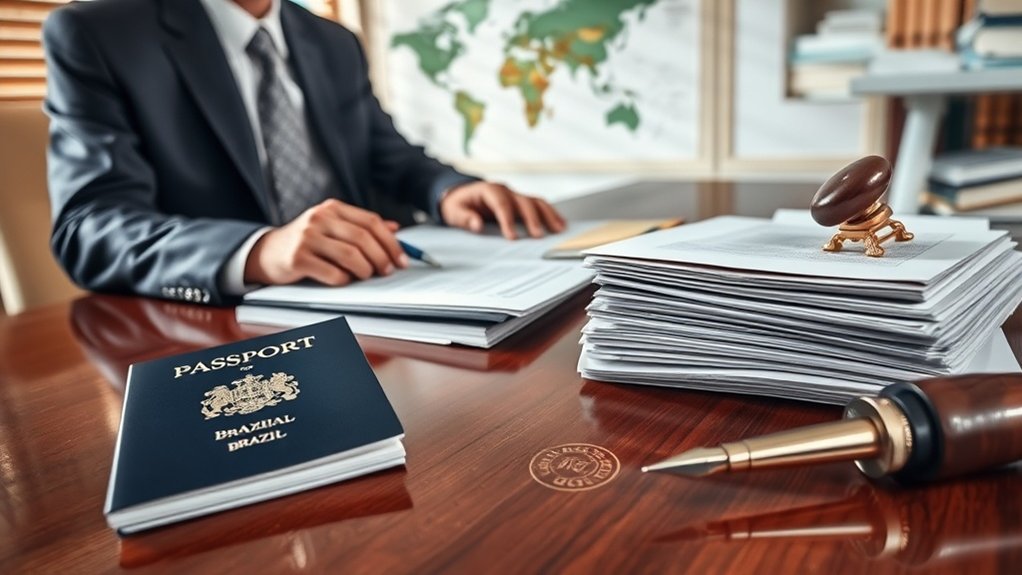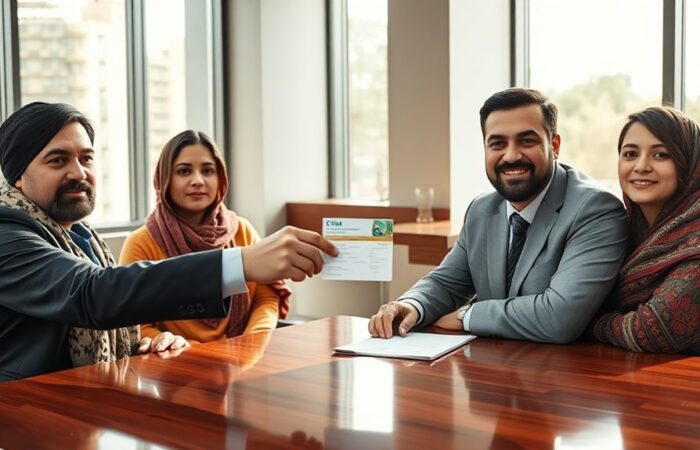If you’re planning to move to Brazil, you’ll quickly realize how strict the country is about legal documents. You can’t just submit originals from abroad—Brazil demands apostilles and sworn translations that meet very specific standards. Missing a single detail could mean delays or even rejection. That’s why it’s crucial to understand how a law firm like Vieira Braga Advogados handles these requirements for you—making sure every paper stands up to scrutiny. But what exactly sets their process apart?
Understanding Brazil’s Legal Requirements for Foreign Documents

When you’re preparing to submit foreign documents for immigration to Brazil, it’s essential to understand the country’s specific legal requirements. Brazil won’t accept documents from other countries at face value; they must meet certain criteria to be valid for official use. First, you need to ensure your documents are authentic and officially recognized in your home country. Then, you must translate them into Portuguese. Brazil only accepts translations completed by a sworn translator (“tradutor juramentado”) registered in Brazil. Regular translations or those done abroad aren’t sufficient for legal processes.
Moreover, you’ll need to present both the original document and its sworn translation. Each document type—such as birth certificates, marriage licenses, or academic records—may have its own additional requirements. By addressing these details upfront, you’ll avoid unnecessary delays. Carefully following Brazil’s legal process sets a strong foundation for your immigration journey and ensures that your documents are processed smoothly and efficiently. For those unfamiliar with these procedures, working with a specialized attorney can provide professional support to ensure compliance and increase your chances of a successful immigration process.
The Importance of Apostilles in International Moves
Before your documents can be officially recognized in Brazil, they need more than just a certified translation. You’ll also need an apostille—a special certificate that proves your documents are authentic and legally valid for use abroad. When you’re moving internationally, apostilles streamline the process by eliminating the need for embassy or consulate legalization. This saves you both time and unnecessary steps. Brazil, as a member of the Hague Apostille Convention, only accepts foreign documents with an apostille attached. Without it, your paperwork might be rejected, delaying your immigration process or legal procedures. As Brazilian immigration laws can be complex and require strict compliance with documentation standards, securing an apostille is a crucial step to ensure your documents are accepted without issue.
How Sworn Translations Ensure Document Validity

When you use sworn translations for your documents, you guarantee they’re legally recognized in Brazil. This level of accuracy is essential for any official process, especially immigration. By meeting all compliance standards, you avoid setbacks and keep your application on track. Working with professionals who understand the complexity and constant updates of Brazilian immigration laws further ensures your documents fulfill every legal requirement.
Legal Recognition in Brazil
Because Brazilian authorities require official documents to be both authentic and understandable, sworn translations play a crucial role in legal recognition. When you submit foreign documents, Brazilian officials won’t accept them unless a sworn translator, registered with a public board, translates them into Portuguese. This isn’t just a formality—it’s a legal requirement that validates your paperwork for use in courts, public agencies, or immigration processes. By securing sworn translations, you make sure your documents meet Brazil’s strict standards. Having expert guidance during this process can also help you avoid errors that might delay or complicate your immigration application.
Here’s a quick look at how sworn translations impact legal recognition:
| Requirement | Why It Matters |
|---|---|
| Translation by sworn translator | Ensures legal validity |
| Registration with public board | Confirms translator’s authority |
| Portuguese language | Required for all official documents |
| Stamp and signature | Certifies authenticity |
| Acceptance by authorities | Guarantees process moves forward |
Accuracy for Official Purposes
Although official documents must be clear and trustworthy, only sworn translations provide the level of accuracy that Brazilian authorities demand. When you submit documents for immigration or other official purposes in Brazil, any error or ambiguity can cause delays or rejections. Sworn translators are certified professionals who understand legal terminology and work under strict guidelines. They don’t just translate your documents—they certify that every word matches the original. This process ensures that nothing gets lost or misinterpreted along the way. For those pursuing immigration, professional legal assistance is essential to avoid common errors in documentation and to ensure that translations meet all requirements set by Brazilian law.
Compliance With Immigration Requirements
To meet Brazil’s strict immigration requirements, you need more than just accurate translations—you need sworn translations that guarantee your documents’ validity. Brazilian authorities recognize only sworn translations performed by officially authorized translators. If you submit documents with regular translations, your application will likely face delays or even rejection. Sworn translations ensure that every detail in your documents matches the original, preserving legal value and authenticity. They also include the translator’s official seal and signature, which prove the legitimacy of your paperwork. Without this, your documents aren’t considered valid in Brazil’s immigration process. By choosing sworn translations, you show compliance with the law and avoid unnecessary complications. It’s a crucial step that protects your interests and keeps your immigration journey on track. Working with an immigration lawyer ensures that your sworn translations and required documentation are prepared and submitted correctly, reducing the risk of costly mistakes or delays.
Common Pitfalls in Document Preparation for Brazil

When preparing documents for immigration to Brazil, many applicants overlook crucial requirements that can delay or jeopardize their process. You might think your paperwork is in order, but missing an apostille or submitting non-certified translations can lead to immediate rejection. Common pitfalls include not checking if all foreign documents need apostilles, using uncertified translators, and failing to verify that every page is properly stamped and signed. Sometimes, applicants submit expired documents or forget to ensure consistency in personal details, such as names or dates.
Another frequent mistake is assuming that English translations are enough—Brazilian authorities require sworn translations into Portuguese. If you don’t double-check the official requirements for your specific visa or residency type, you risk unnecessary setbacks. By not paying close attention to these details, you might face costly delays or need to start over entirely. Accurate, complete, and properly authenticated documents are essential for a smooth immigration process. Consulting with specialized legal assistance helps avoid these documentation errors and increases the chances of a successful immigration application.
The Vieira Braga Advogados Approach to Hassle-Free Immigration
Because immigration rules can feel overwhelming, Vieira Braga Advogados streamlines the process by handling every document with precision. You don’t have to worry about missing signatures, incorrect translations, or outdated forms. Their team reviews your paperwork, secures necessary apostilles, and coordinates sworn translations—all in one place. This approach ensures your documents comply with Brazilian immigration requirements from the start.
Additionally, working with Vieira Braga Advogados means benefiting from specialized legal assistance that increases your chances of visa approval and avoids costly errors.
To clarify what you gain, see the table below:
| Step | Your Task | Vieira Braga’s Role |
|---|---|---|
| Gather Docs | Submit originals | Verify completeness |
| Apostille | None | Obtain official stamps |
| Translation | None | Secure sworn translators |
| Submission | Review | Ensure legal compliance |

When you handle apostilles and sworn translations correctly, you streamline the entire document legalization process. You won’t face unnecessary hold-ups, which means less stress and faster results. This approach helps you cut through the usual delays in Brazilian bureaucracy. Having specialized legal support also ensures that all your documents meet the strict requirements of Brazilian immigration authorities, greatly reducing the risk of costly errors or rejections.
Streamlining Document Legalization
Although Brazil’s immigration process can seem daunting, streamlining document legalization with apostilles and sworn translations saves you time and frustration. You won’t need to navigate confusing requirements or risk missing key steps—Vieira Braga Advogados handles everything efficiently. By preparing your documents with the right apostilles and certified translations from the start, you avoid unnecessary back-and-forth with authorities. This proactive approach keeps your paperwork organized and compliant, so you don’t have to second-guess if you’re meeting Brazil’s strict standards.
Instead of juggling multiple agencies or struggling with complex forms, you can rely on a single, knowledgeable team. They’ll ensure every document is correctly processed and ready for your immigration application. With expert guidance, you end up with fewer surprises and a smoother experience overall. By working with professionals who understand the complexity of immigration laws, you reduce the risk of costly errors or delays in your Brazilian immigration process.
Reducing Processing Delays
With your documents properly apostilled and translated, you’re already a step ahead in avoiding the common pitfalls that slow down immigration cases in Brazil. Brazilian authorities are strict about document requirements, and any missing or improperly prepared paperwork can stall your application for weeks or even months. By having Vieira Braga Advogados handle your apostilles and sworn translations, you ensure your documents meet all legal standards right from the start.
You won’t have to worry about requests for corrections or additional information, which are among the main causes of processing delays. Instead, your application moves smoothly through the bureaucracy, saving you time and reducing stress. Letting experts prepare your documents means you can focus on your move, confident that unnecessary delays won’t stand in your way.
Frequently Asked Questions
How Long Does It Take to Obtain an Apostille in Brazil?
You can usually obtain an apostille in Brazil within a few days if you submit your documents at a local notary office (cartório). Processing times often range from one to five business days, depending on the office’s workload and location. It’s a good idea to confirm requirements in advance, as delays can happen if documents aren’t correctly prepared. Plan ahead, so you don’t encounter unexpected issues or miss important deadlines.
Can Vieira Braga Advogados Assist With Visa Applications as Well?
Yes, Vieira Braga Advogados can assist you with visa applications as well. You’ll get personalized guidance throughout the entire process, from gathering the right documents to submitting your application. Their team understands the requirements and deadlines, so you won’t have to navigate Brazilian bureaucracy alone. By working with them, you increase your chances of a successful visa outcome, ensuring your immigration process is as smooth and stress-free as possible.
What Are the Costs Involved in Sworn Translations and Apostilles?
When you request sworn translations and apostilles, expect costs to vary based on the document’s length, language pair, and urgency. Sworn translation fees in Brazil usually range from R$70 to R$150 per page. Apostille charges are set by the notary office and typically cost around R$100 to R$150 per document. If you need expedited service or complex documents, you’ll likely pay more, so always request a detailed quote upfront.
Are Digital Copies of Apostilled Documents Accepted by Brazilian Authorities?
Yes, Brazilian authorities generally require original apostilled documents or certified hard copies for most official processes. If you submit digital copies, they may not accept them unless it’s specifically allowed by the requesting agency. You should always check with the relevant Brazilian authority before relying on scanned or digital documents. To avoid delays in your process, make sure you have physical, properly apostilled documents ready for submission when required.
Do Apostilles and Sworn Translations Expire or Need Renewal?
Apostilles themselves don’t expire, but authorities may require recent documents for specific procedures, so you’ll want to check how old your apostilled document can be. Sworn translations generally don’t have an expiration date either, but if the original document changes, you’ll need a new translation. It’s a good idea to ask the Brazilian authority handling your process if they have time limits for accepting apostilled documents or translations.
Conclusion
When you trust Vieira Braga Advogados with your Brazil immigration documents, you’re taking a smart step toward a smoother process. By preparing apostilles and sworn translations, the firm helps you avoid costly mistakes and frustrating delays. Their expertise ensures your paperwork is valid, recognized, and ready for Brazilian authorities. Let them handle the details, so you can focus on your future in Brazil and move forward with confidence, knowing your immigration journey is in capable hands.



